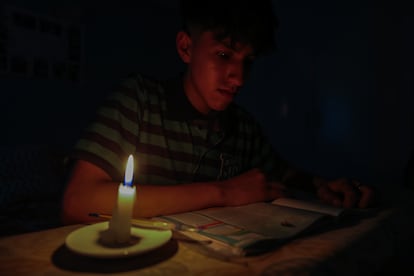Severe energy crisis paralyzes Ecuador for two days
President Daniel Noboa has suspended work and school on Thursday and Friday, and accuses the outgoing energy minister of having hidden the problem

Ecuador is in the dark. Not only because the more-than-seven-hour long blackouts continued throughout the country on Wednesday, despite the presidential announcement that they would be suspended, but also because it’s not known who is behind the crisis in the energy sector, nor the scale of the problem. Decisions taken by the Ecuadorian government have provided some clues. For example, the president of Ecuador, Daniel Noboa, signed a decree that will paralyze the country for two days. On Thursday and Friday, school will be suspended and there will be no work in either the public or private sectors.
The document said that the move is to ensure “rest and leisure,” but a few hours after it was signed, the underlying reason for the move was revealed: the critical conditions of the two most important reservoirs that provide water to the country’s hydroelectric plants. “Mazar is registering an operational storage level of 0% and Paute of 4%,” said a statement from the presidency. Ecuador’s electricity provider CENACE said the situation has reached record lows, warning that the energy deficit in the country is up to 27 gigawatts per day.
The Ecuadorian government said that based on a preliminary investigation carried out by the new energy minister, Roberto Luque, the crisis is not only related to the lack of rain that has extended the drought period, but to acts of corruption and negligence by high-level Energy Ministry officials, including former minister Andrea Arrobo. “They intentionally hid information crucial for the functioning of the national energy system,” the statement said. “They suppressed and undid warnings and alerts to the Energy Crisis Committee, with the purpose of ensuring that this serious situation is not known so that timely decisions can be made,” it added.
The president first referred to the issue at an event to hand out student scholarships on Monday, nearly a week after the surprise outages began. The problem worsened on Monday, when the blackouts spread throughout the country, lasting up to more than six hours. Some towns like Naranjal went 20 hours without electricity, which sparked street protest.
Faced with the new crisis, Noboa said the blackouts were acts of “sabotage” to hurt the government’s referendum on Sunday, which is seeking public support for legal reforms in areas such as security, justice and employment. In a bid to appease the population, the president also asked the energy minister to resign, offered to subsidize 50% of the April electricity bill and begun an investigation into sabotage, which has already produced results. The government said it has presented the Prosecutor’s Office with “a complaint for paralysis of the public service against 22 saboteurs who sought to harm all Ecuadorians, affecting their development and productivity.”
It is not only “saboteurs” who are behind the energy crisis, according to the presidential statement. In the document, the government said it is also defending citizens from “pretensions of organized crime,” but did not explain the links between the two. The blackouts in Ecuador began in October 2023 and the government of President Noboa — who was elected on October 16 — declared an end to electricity cuts in February.
The executive’s statement did not say how much longer the blackouts will last, but it did warn that power will be rationed on Thursday and Friday — the two days of mandatory rest that the president has decreed — because “maintenance will be carried out on the power plants.” According to the statement, this will lead to “energy rationing at certain non-changeable times.” It is not yet known how many hours the country will remain in the dark.
Sign up for our weekly newsletter to get more English-language news coverage from EL PAÍS USA Edition
Tu suscripción se está usando en otro dispositivo
¿Quieres añadir otro usuario a tu suscripción?
Si continúas leyendo en este dispositivo, no se podrá leer en el otro.
FlechaTu suscripción se está usando en otro dispositivo y solo puedes acceder a EL PAÍS desde un dispositivo a la vez.
Si quieres compartir tu cuenta, cambia tu suscripción a la modalidad Premium, así podrás añadir otro usuario. Cada uno accederá con su propia cuenta de email, lo que os permitirá personalizar vuestra experiencia en EL PAÍS.
¿Tienes una suscripción de empresa? Accede aquí para contratar más cuentas.
En el caso de no saber quién está usando tu cuenta, te recomendamos cambiar tu contraseña aquí.
Si decides continuar compartiendo tu cuenta, este mensaje se mostrará en tu dispositivo y en el de la otra persona que está usando tu cuenta de forma indefinida, afectando a tu experiencia de lectura. Puedes consultar aquí los términos y condiciones de la suscripción digital.








































